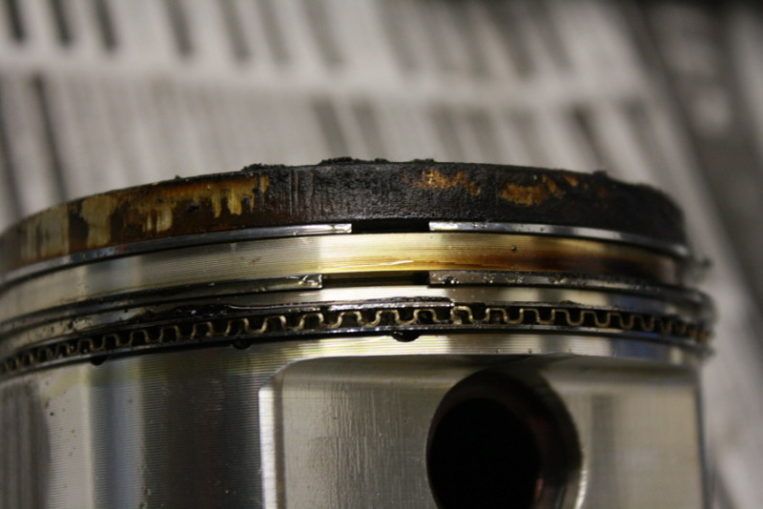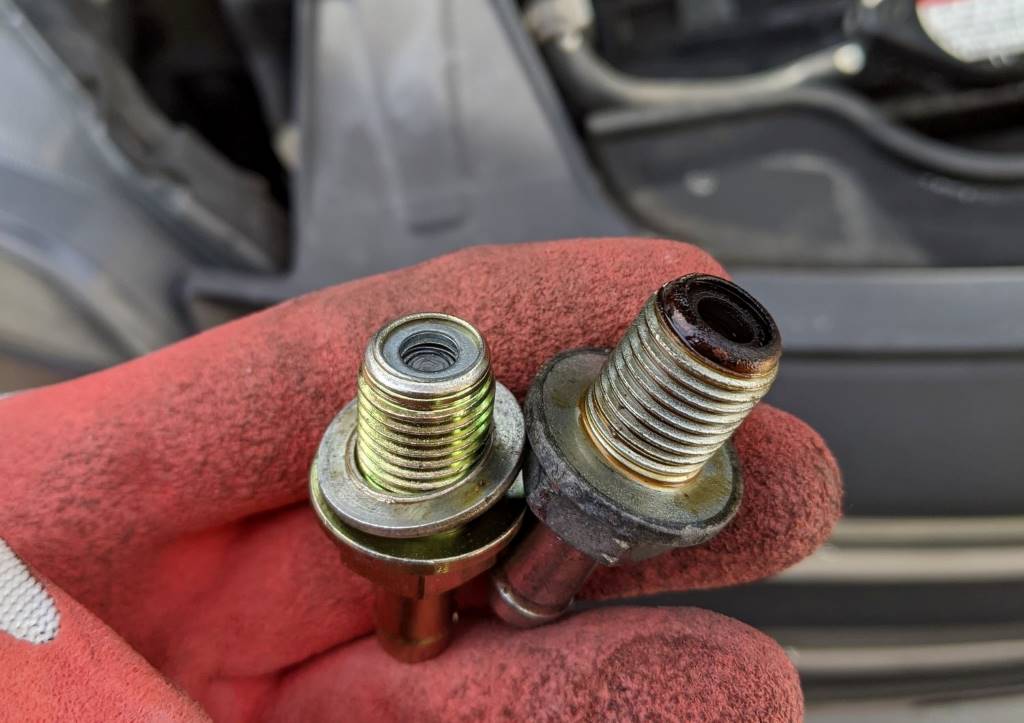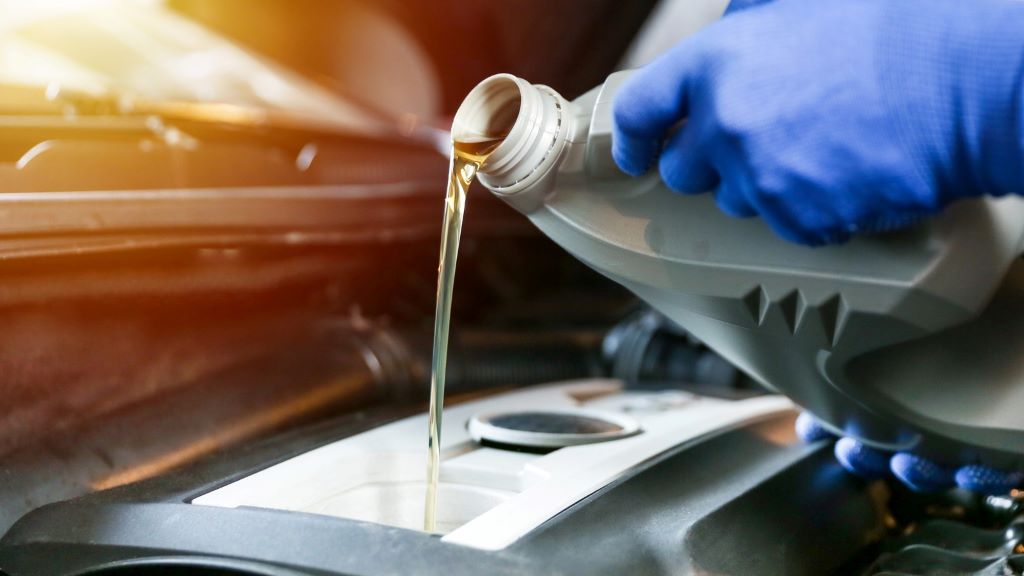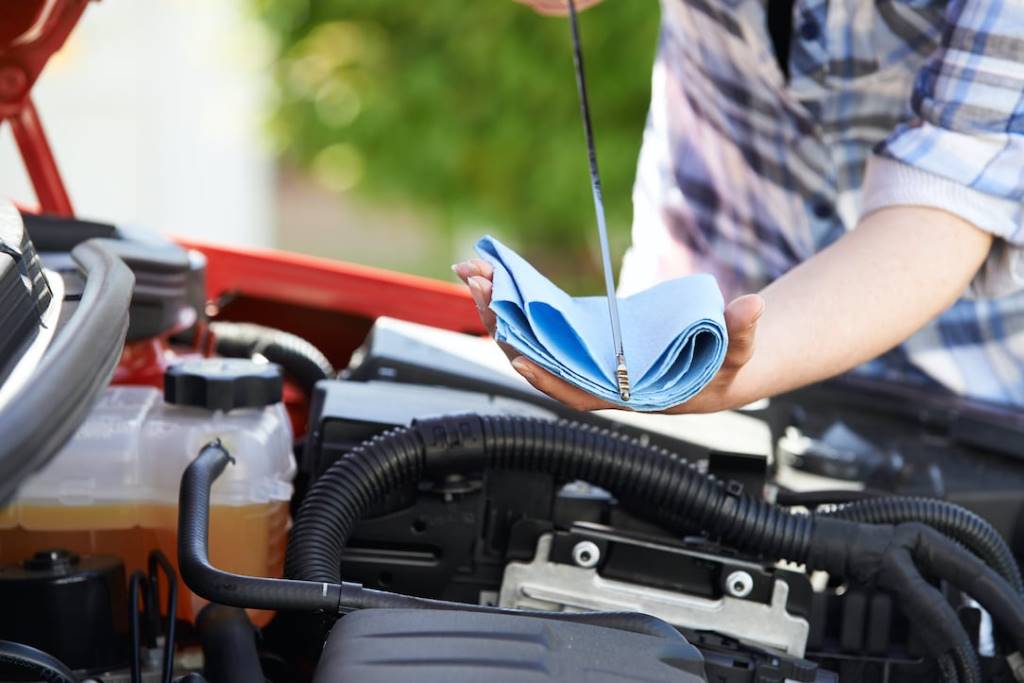If you’re wondering why is my car burning oil so fast, it may be an issue that shouldn’t be ignored. Several factors can cause a car to consume oil at a faster rate, ranging from normal engine operations to significant mechanical problems.
Understanding the reasons behind excessive oil consumption can help you identify the need for maintenance or repairs. Here are five possible reasons why your car might be burning oil in abnormal speed!
Contents
Possible Reasons Why Is My Car Burning Oil So Fast
Here’s a deeper look into some primary reasons why your car might be using oil more quickly than anticipated.
Worn Piston Rings
Piston rings play a pivotal role in the engine’s operation by creating a seal between the outer edge of the pistons and the inner edge of the cylinder.
These rings serve two crucial functions: they prevent oil from leaking into the combustion chamber and ensure that the air-fuel mixture does not escape into the crankcase.
Over time and with regular use, piston rings are subject to wear and tear. They may lose their ability to create an effective seal due to factors like high temperatures, lack of lubrication, or physical damage.
If this occurs, oil can bypass the worn rings and enter the combustion chamber, where it burns off, leading to noticeable oil consumption.
This issue is particularly prevalent in older or high-mileage vehicles where the components have undergone significant stress over time.
The signs of worn piston rings include not just increased oil consumption but also reduced engine power, higher emissions, and in some cases, visible smoke from the exhaust.

Valve Seal Leaks
This component regulates the flow of oil necessary to lubricate the valve stems. Valve seals act as a barrier, preventing oil from entering the combustion chamber. However, just like piston rings, valve seals can deteriorate over time.
Exposure to extreme temperatures, oil contamination, and normal aging can cause the seals to harden, crack, or shrink, compromising their ability to maintain a tight seal.
When valve seals fail, oil can leak into the combustion chamber and is burned during the engine’s operation, leading to increased oil consumption.
A failing valve seal sign shows in blue smoke from the exhaust upon starting the engine, especially after the vehicle has been sitting for a while, which indicates oil has seeped past the seals and into the combustion chamber while the car was off.
PVC System Malfunction
The Positive Crankcase Ventilation system plays a critical role in an engine’s operation by managing the pressure and removing gasses from the crankcase to reduce emissions. It routes these gasses back into the combustion chamber where they can be burned off harmlessly.
However, when the PCV valve or the system itself malfunctions, it can lead to an imbalance in pressure and the unintended movement of oil into the combustion chamber. This problem often results from a clogged valve or hose within the system, which can prevent the correct flow of gasses.
As a result, oil may begin to leak into the combustion chamber, leading to increased oil consumption. Symptoms of a PCV system malfunction include oil leaks, a rough idle, or a decrease in engine performance.
If you check and maintenance of the PCV system can prevent such issues, ensuring that any blockages are cleared and components are in good working condition.

Engine Wear and Tear
Engine wear and tear is a natural consequence of the operation of any vehicle. As an engine ages, key components such as bearings, cylinders, piston rings, valve guides, and seals begin to wear down. This wear creates gaps and reduces the effectiveness of these components in maintaining tight seals.
Specifically, bearings that have worn out can lose their ability to maintain precise clearances, allowing oil to escape into areas it shouldn’t, like the combustion chamber.
Similarly, wear on the cylinder walls and piston rings can compromise the seal that keeps oil in the crankcase and out of the combustion chamber.
Valve guides and seals, which are critical for the operation of the intake and exhaust valves, can also allow oil to drip into the combustion chamber when they wear out or are damaged.
Regular maintenance is key to minimizing these effects as much as possible, but some degree of wear is inevitable and may necessitate more significant repairs to curb excessive oil consumption.
Using the Wrong Type of Oil
The type of oil used in your vehicle also has a significant impact on oil consumption. Oils are available in various viscosities, which determine their thickness and flow characteristics at different temperatures.
Using an oil with a viscosity that is too low for your vehicle can lead to increased oil consumption because thinner oils can more easily seep through the clearances within an engine, especially one that has experienced some wear.
On the other hand, using oil that is too thick can result in inadequate lubrication, as the oil may not flow as freely to all the necessary parts of the engine.
While thicker oils are less likely to be burned off due to their higher viscosity, they can still contribute to wear by not providing sufficient lubrication where it’s needed.
Manufacturers specify a particular oil type and viscosity for each vehicle model based on extensive testing.
This specification is designed to ensure the oil provides the optimal balance of lubrication, protection, and efficiency for the engine’s specific design and operational requirements.

FAQs on Car Burning Oil
1. Does frequent short-distance driving contribute to increased oil consumption?
Frequent short trips can lead to increased oil consumption over time. Short-distance driving often prevents the engine from reaching its optimal operating temperature, which can contribute to moisture accumulation in the oil and the formation of sludge. This sludge can clog oil passages and lead to higher oil consumption.
2. Can aftermarket modifications affect oil consumption?
Aftermarket modifications that increase engine power, such as turbochargers or software tuning, can also increase oil consumption. These modifications often put additional stress on the engine, which can lead to faster wear of engine components and, consequently, higher oil usage.
3. Is it normal for a new car to burn oil?
It’s not uncommon for a new car to consume a small amount of oil as the engine “breaks in” during the first few thousand miles. However, excessive oil consumption in a new car is not normal and should be addressed under the vehicle’s warranty.
4. How does the climate or weather affect oil consumption?
Extreme temperatures, both hot and cold, can influence how quickly a car burns oil. In very cold weather, oil tends to thicken, which can lead to increased resistance within the engine and potentially higher consumption.
In contrast, in hot climates, oil can thin out, which might lead to increased consumption through greater volatility or easier passage through worn engine components.
5. Can changing my driving habits reduce oil consumption?
Adopting smoother driving habits can potentially reduce oil consumption. Aggressive acceleration and high-speed driving increase engine load and temperature, which can accelerate wear and tear on engine components and lead to higher oil consumption.
Performing a more conservative driving style can help mitigate these effects.
6. Will using oil additives help reduce consumption?
Some oil additives claim to reduce oil consumption by rejuvenating seals or reducing oil burn-off.
While they may provide a temporary fix in some cases, they’re not a permanent solution to underlying mechanical issues causing oil consumption. It’s essential to address the root cause of the oil consumption for a long-term solution.
Check out this video from Scotty Kilmer to learn how to fix a car engine that burns oil DIY!
Understanding the nuances of why is my car burning oil so fast can help car owners take more informed steps towards diagnosing and fixing the issue.
While some factors, like engine wear and using the wrong oil type, are well-known, exploring these less common questions reveals the complexity of engine management and the importance of comprehensive maintenance practices.



